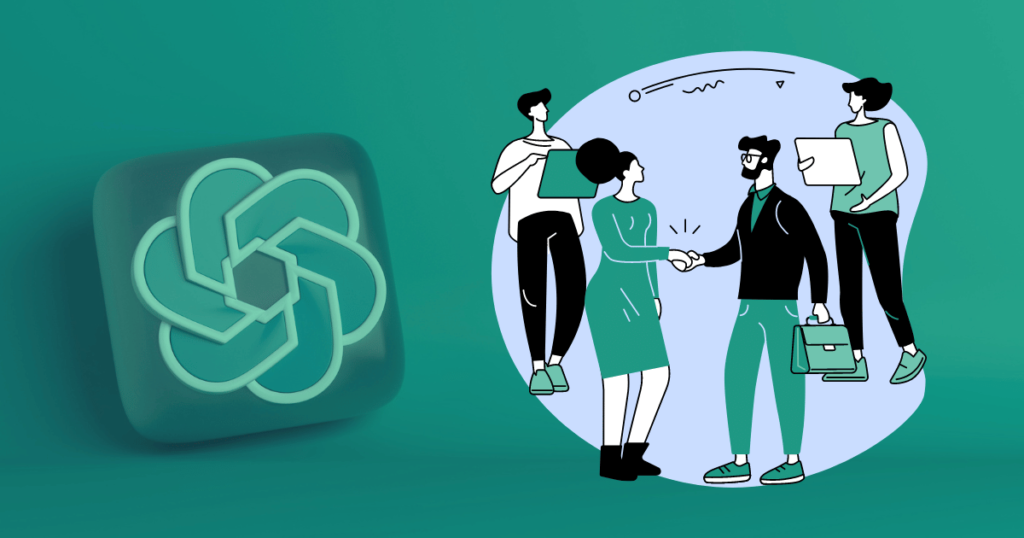ChatGPT is a powerful artificial intelligence tool that can be used by facilitators to make meetings more interactive and productive. Through natural language processing, ChatGPT allows facilitators to quickly identify areas of discussion or topics that may need further exploration.
There’s a new obsession in The Facilitation Hub lately… it’s called ChatGPT! We’re all obsessed.
ChatGPT enables facilitators to keep up with group dynamics, helping them manage conversations more efficiently.
This revolutionary new AI-powered tool has features that make it easy for facilitators to monitor real-time feedback from meeting participants and adjust their approach accordingly.
By using ChatGPT, facilitators can create an engaging environment for virtual conversations and maximize productivity in both small and large groups.
Contents
What Is ChatGPT?
ChatGPT is a cutting-edge chatbot technology that makes communicating with customers more personal and intuitive.
With the help of artificial intelligence, ChatGPT helps companies provide excellent customer service by understanding natural language questions and quickly responding to them in an easy-to-understand manner.
In addition to helping businesses, marketers and tech gurus, ChatGPT also provides valuable analytics that can be used to optimize customer service experiences.
5 Way Facilitators Can Use ChatGPT
Without further ado, here are 5 ways that facilitators can use ChatGPT 👇
1. Sentiment Analysis
As a facilitator, you can leverage ChatGPT’s capabilities for sentiment analysis to gain valuable insights into the emotions and opinions expressed in text data.
This text data may be comments from a workshop, survey responses, of notes from a participative activity.
The process is simple: feed the model text, and it’ll predict the sentiment behind it.
To make sure ChatGPT is well equipped for the task, fine-tune it on a large dataset of text with labeled sentiments – positive, negative, or neutral. Once it’s been fine-tuned, you’re good to go!
Just input new text, and ChatGPT will give you probabilities for each sentiment class.
Then, use a threshold to determine the final sentiment prediction.
To assess ChatGPT’s performance, compare its predictions to the sentiment labels in a separate evaluation dataset.
By using ChatGPT for sentiment analysis, you’ll have a powerful tool for gaining a deeper understanding of the emotions conveyed in text.
2. Summarize Complex Topics Using Simple Language
Summarizing complex topics in simple language can be a challenge, but it’s a critical skill for making information accessible and understandable for a wider audience.
With ChatGPT’s language generation capabilities, this task becomes much easier.
Here’s how you can use it to summarize complex topics:
- Input the complex text or information into ChatGPT.
- Provide the desired length of the summary.
- Ask ChatGPT to generate a summary in simple language.
It’s that simple! ChatGPT will analyze the complex information and generate a concise and easily understandable summary, using plain language that’s accessible to everyone.
Whether you’re looking to present research findings, explain a complex process, or make technical information more approachable, ChatGPT’s summarization capabilities can help you get the job done.
With its ability to simplify complex topics, ChatGPT can help you ensure that important information is accessible to everyone, regardless of their background or expertise.
3. Plan Effective Session Plans for Meetings and Workshops
As a facilitator, you know that planning effective sessions is key to making meetings and workshops productive and engaging.
ChatGPT can help make this task easier and more efficient.
Here’s how you can use it to plan effective session plans:
- Input information about the meeting or workshop goals, attendees, and time constraints into ChatGPT.
- Ask ChatGPT to generate suggestions for a session plan, taking into account the input information.
- Review the suggestions and refine them as needed to create the final session plan.
With ChatGPT’s ability to understand context and generate relevant suggestions, you can save time and effort in the planning process. The model can suggest activities, breakouts, group discussions, and other elements that will help you achieve your goals and engage your audience.
Whether you’re planning a workshop on leadership development, a team-building session, or a stakeholder meeting, ChatGPT can help you create a customized and effective session plan that meets the unique needs of your group.
By leveraging ChatGPT’s expertise in planning and facilitation, you can make the most of every meeting and workshop, and ensure that attendees leave feeling informed, inspired, and engaged.
See also: 8 Facilitation Techniques to Use on Zoom
4. Write Agendas
A clear and well-organized agenda is important in setting the tone and direction for a successful meeting or workshop.
ChatGPT can help you write effective agendas quickly and easily.
Here’s how you can use it:
- Input information about the purpose, attendees, and desired outcome of the meeting or workshop into ChatGPT.
- Ask ChatGPT to generate a preliminary agenda, taking into account the input information.
- Review the generated agenda and make any necessary adjustments to ensure it meets the specific needs of your meeting or workshop.
With ChatGPT’s ability to understand context and generate relevant suggestions, you can save time and effort in the agenda-writing process. The model can suggest key topics, group activities, breakouts, and other elements that will help you achieve your goals and engage your audience.
Whether you’re planning a strategy session, a team meeting, or a large conference, ChatGPT can help you create an agenda that is tailored to the needs of your group.
With ChatGPT, you can ensure that your meetings and workshops run smoothly and efficiently, and that attendees leave feeling informed, inspired, and engaged.
5. Draw Conclusions From Qualitative Data
Drawing meaningful conclusions from qualitative data can be a complex and time-consuming task – we’ve all been there!
However, with the power of ChatGPT, facilitators can now streamline the process and gain valuable insights in a fraction of the time.
Here’s how ChatGPT can help:
- Input the qualitative data into ChatGPT.
- Ask ChatGPT to generate a summary of the data and identify key themes and patterns.
- Review the generated summary and conclusions to gain insights and make informed decisions.
ChatGPT’s advanced natural language processing capabilities allow it to analyze large volumes of qualitative data and extract meaningful insights quickly and efficiently.
The model can identify trends, patterns, and themes that would be difficult for a human to discern, saving you time and effort in the data analysis process.
With ChatGPT’s ability to generate clear and concise summaries, you can quickly understand the key takeaways from your qualitative data and make informed decisions based on your findings.
You can improve your ability to make sense of qualitative data and gain valuable insights that can inform your work and drive positive change.
Whether you’re conducting research, analyzing customer feedback, or assessing employee engagement, ChatGPT can help you draw meaningful conclusions from qualitative data and take your work to the next level.
Benefits of using ChatGPT
It’s not just a customer service tool like some piece-of-trash chatbot we’ve used in the past – it does so much more than that.
Are you tired of spending countless hours on tedious tasks that take away from the more important aspects of facilitation? Well, I have some exciting news for you. ChatGPT is here to make your life easier and more efficient.
Have you ever wished you had a personal assistant to help with brainstorming session ideas, writing agendas, or analyzing data? That’s exactly what ChatGPT is. It’s like having a virtual assistant that can handle all the nitty-gritty details for you. All you have to do is input some basic information and let ChatGPT do the rest.
Not only does ChatGPT save you time, but it also improves the quality of your work. The model has been trained on a vast amount of data, so it can provide you with suggestions and insights that you may have never thought of before.
Plus, ChatGPT’s advanced natural language processing capabilities allow it to understand context and generate relevant suggestions, so you don’t have to waste time sorting through irrelevant information.
And the best part? ChatGPT never takes a break (except when it’s too busy…but more on that later), so you can get work done whenever and wherever you need to.
So say goodbye to late nights and a lack of coffee breaks, and hello to more free time and better work.
ChatGPT is a game-changer for facilitators.
Not only does it save time and improve the quality of your work, but it also provides new and valuable insights that can take your facilitation to the next level. So what are you waiting for? Give it a try and see the benefits for yourself!
There are loads of creative prompt ideas on gptwhisperer.com!
Issues with ChatGPT
As with all technology, comes issues.
ChatGPT is new and novel, and therefore very popular.
It’s frequently at capacity and unavailable:

Also, let’s talk about accuracy.
ChatGPT is a highly advanced language model, but it’s still just that – a model. It’s not perfect, and sometimes it can make mistakes or generate irrelevant information.
That’s why it’s important for facilitators to double-check the information generated by ChatGPT before using it in their work.
Another potential issue is the reliance on technology.
While having a virtual assistant is great, it’s essential to remember that technology is not a replacement for human skills and judgment.
Facilitators need to be able to think critically and make decisions based on their expertise and experience, not just blindly following the suggestions generated by ChatGPT.
Finally, there’s the question of privacy and security.
When you input sensitive information into ChatGPT, you’re putting your trust in the hands of the company that developed the model. Make sure to do your due diligence and research the company’s privacy and security policies before using ChatGPT.
Despite ChatGPT being a highly advanced tool that can save time and improve the quality of your work, it’s essential to be aware of the potential issues and to use it responsibly.
Remember, technology is a tool, not a solution, and it’s up to us as facilitators to make the most of it.
Summary
So, there you have it folks! ChatGPT is a powerful tool that can help facilitators streamline their work and make their lives a whole lot easier.
From sentiment analysis to session planning and everything in between, ChatGPT has got you covered.
Just remember, it’s important to use this tool responsibly and to always double-check the information generated by ChatGPT before using it in your work.
Overall, ChatGPT is a game-changer for facilitators and a must-have tool for anyone looking to step up their facilitation game.
So, what are you waiting for? Give it a try today and see for yourself just how amazing it can be!



